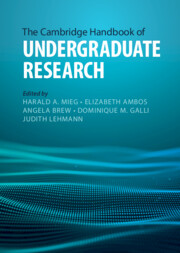Book contents
- The Cambridge Handbook of Undergraduate Research
- The Cambridge Handbook of Undergraduate Research
- Copyright page
- Contents
- Figures
- Tables
- Contributors
- Foreword
- Foreword
- 1 Introduction
- Part I Theory and Research on Undergraduate Research
- 2 Theory and Research on Undergraduate Research
- 3 Undergraduate Research
- 4 Undergraduate Research
- 5 Undergraduate Research
- 6 Undergraduate Research
- Part II Implementation, Approaches, Methods
- Part III Disciplines
- Part IV International Perspective
- Part V Avenues for Developing Undergraduate Research
- Index
- References
6 - Undergraduate Research
A Philosophical View
from Part I - Theory and Research on Undergraduate Research
Published online by Cambridge University Press: 11 August 2022
- The Cambridge Handbook of Undergraduate Research
- The Cambridge Handbook of Undergraduate Research
- Copyright page
- Contents
- Figures
- Tables
- Contributors
- Foreword
- Foreword
- 1 Introduction
- Part I Theory and Research on Undergraduate Research
- 2 Theory and Research on Undergraduate Research
- 3 Undergraduate Research
- 4 Undergraduate Research
- 5 Undergraduate Research
- 6 Undergraduate Research
- Part II Implementation, Approaches, Methods
- Part III Disciplines
- Part IV International Perspective
- Part V Avenues for Developing Undergraduate Research
- Index
- References
Summary
Undergraduate research requires students to address key contemporary issues that challenge democratic society: how knowledge develops, how truth is established, and the importance of values and relationships within the scientific endeavor. This chapter argues that undergraduate research rests on, and has grown as a consequence of, changes in how knowledge is produced, including the freeing of disciplinary boundedness and the democratization of knowledge production. The latter is fundamental to undergraduate research because it raises questions about the relationship of research to society. It critically questions who the scholars are in universities and challenges elitist notions regarding the generation of knowledge. The chapter argues that fundamental philosophical challenges that underpin traditional research, and still persist in research practice, have provided opportunities for new forms of research and pedagogy. As such, undergraduate research has the capacity to transform students’ lives and to teach them how to live and work in a complex society characterized by ambiguity and unpredictability.
Keywords
- Type
- Chapter
- Information
- The Cambridge Handbook of Undergraduate Research , pp. 72 - 84Publisher: Cambridge University PressPrint publication year: 2022

